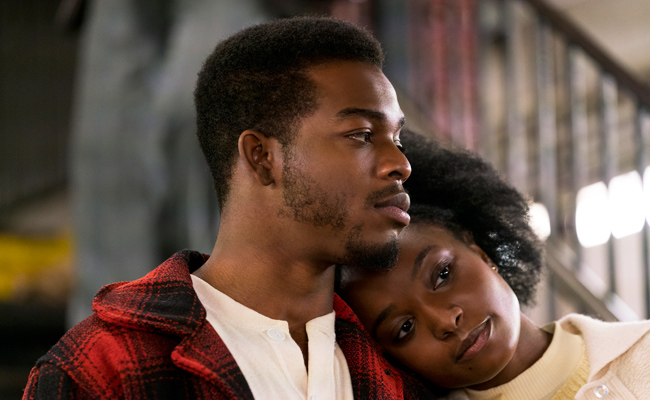
Barry Jenkins’ characters glow. That’s really the only way to describe them, so radiant and redolent and inviting that you can’t help but fall in love. Jenkins and his cinematographer James Laxton (who also shot Moonlight) are the most sensual filmmaking team working, and in If Beale Street Could Talk, they’ve created more visual comfort food, the optical equivalent of Sam Cooke’s voice, or Mahershala Ali’s laugh — a booming, soulful thing that you just want to wrap yourself in like a winter coat. Beale Street is the black Brooklyn, a heartfelt elegy to our most recent ancestors, a kind of collective home movie of black Americana. It’s a masterpiece.
Beale Street isn’t quite as easy as Brooklyn, where the main antagonist was homesickness and feeling unstuck in the world, which is only fitting for a film about the black experience in America. Based on the 1974 novel by James Baldwin (the title is a reference to an old blues song), profiled in 2016’s unforgettable I Am Not Your Negro, Beale Street tells the story of 19-year-old Tish (KiKi Layne) and 22-year-old Fonny (Stephan James), childhood friends and young lovers who find out Tish is pregnant right about the time Fonny gets accused of raping a Puerto Rican woman.
Layne’s acting is a little distracting at first, broad and overly bashful and a little slow, like she’s playing the ingenue in a Disney musical. But eventually you settle in, partly thanks to her excellent, plainspoken voiceovers, and partly because Beale Street kind of is a musical. It’s not obvious at first because no one’s singing, but the acting is just a little behind the beat, and eventually you fall into the groove — a kind of mellow, syrupy revery, like the blues song the film is named after.
There’s a masterpiece of an ensemble scene, a house party at Tish’s house featuring Fonny’s family — her gregarious father, Frank (Michael Beach), Bible-thumping battle axe mom played by Aunjanue Ellis, and two sisters — “celebrating” with Tish’s — her mother played by Regina King, sister (Teyonah Harris), and father played by Colman Domingo, another guy with a laugh so soothing you can practically slow dance to it.
In the scene, meant to celebrate the pregnancy, the dads pour Hennessee and Fonny’s teetotaling mom hurls invective while her husband tries to shut her up. Tish’s mom tries to mediate, the various sisters support their respective sides, and Frank is just sort of caught in the middle. The whole thing crackles, with juicy one-liners and capital D drama. It plays almost like a deluxe gourmet version of a Tyler Perry scene, the same clapbacks without the shortcuts. And in Barry Jenkins’ hands, it all has a folkloric quality, so clearly a story about then that’s meant to tell us something about who we are now.
The same way you could practically feel the humid summer heat in Moonlight, you can all but touch and smell the supple Earth-toned leather and polyester in Beale Street. It’s all so rich and tactile. Even if the story didn’t work Beale Street would be worth watching just as a series of portraits. It’s like being able to live inside an old photograph of your parents.
For all its comfort food qualities, at the center of the story is a tale of racism, redlining, police abuse, and a predatory penal justice system. When Fonny’s friend, Danny (Brian Tyree Henry, who deserves some kind of cumulative supporting actor honor for all the movies and shows he’s improved with his presence this year) tells Fonny of his time at Riker’s, his voice creaks under the weight of reliving the trauma. And yet even in times of duress, the boozy, smoky scene never loses its essential quality, of feeling like a candid conversation between your parents and their friends that you feel privileged to have witnessed.
This is part of Beale Street’s power, its refusal to be maudlin. It’s not about trauma but about family in the face of it. Its power is in the way it says that injustice isn’t out of place in a heartwarming family drama; it’s part and parcel to these characters’ experience, to being black in America. Like the blues, Beale Street can soothe even as it tells a disturbing story. It’s easily one of the best of the year.
Vince Mancini is on Twitter. You can find his archive of reviews here.






